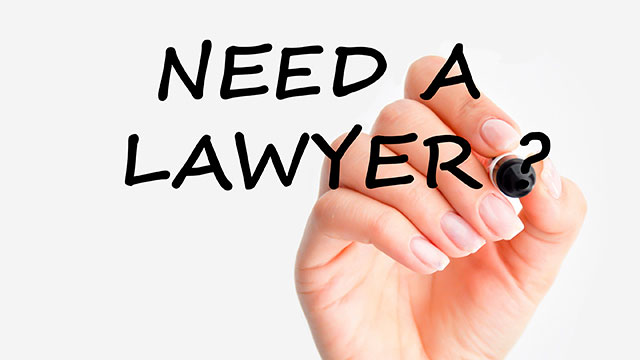Attorneys are a necessity in today’s complex world. Most people will need the services of an attorney at some point during their lives. Choosing the right attorney can make all the difference when you’re faced with a situation that requires one.
Types of Attorneys – Areas of Law
As with other professionals, many attorneys have a specific area of expertise. You will need to determine which area of law your situation falls into when beginning your search for an attorney. Some of the most common areas of law include:
Family Law – Divorce, custody, paternity, prenuptial agreements.
Criminal Defense – Represents those accused of crimes ranging from misdemeanors to felonies.
Personal Injury – Vehicle accidents, wrongful death, medical malpractice, slip or trip and fall, dangerous drugs or medical devices, nursing home abuse, defective products, work accidents.
Civil Litigation – Non-criminal litigation law, such as contract disputes or lawsuits involving businesses.
Business / Corporate – Business transactions, company formation, mergers, acquisitions, employment, tax compliance, intellectual property.
Estate Planning – Wills, living wills, estate plans, trusts, powers of attorney.
Tax – Comply with tax laws, resolve IRS problems, tax returns, corporate tax issues.
Bankruptcy – Chapter 7, Chapter 13, Chapter 11 bankruptcy filings.
Immigration – Visas, deportation, appeals, renewals
Real Estate – Residential, commercial, purchase, lease agreements, litigation.
Workers Compensation – Workers who have been injured on the job
Social Security – Obtain benefits for those who are entitled to them and are struggling to receive them
Where to Find Attorneys
There are a number of different ways to locate attorneys in your area. A referral from a friend or family member is a good way to find an attorney. A personal referral will often provide you with peace of mind in knowing that someone you know had a good experience with the attorney.
If you don’t have a referral source, you can do an online search for a list of attorneys in your area, such as “personal injury attorney (your zip code or city)”. This search will bring up a list of attorneys, their locations and possibly ratings from previous clients that may prove useful.
The State Bar in your state may also have a website with a section to search for an attorney within the area of law that you are seeking. The search may include your city and/or zip code so that the results locate attorneys near you.
Online lawyer directories, or attorney referral services may provide you with a list of potential attorneys for your needs. However, these attorneys often pay to be listed in these directories or referral services, so you may not get to see all of the possible attorneys to choose from in your area.
Many attorneys advertise locally. If you like their message and feel that they may be able to help you, add them to your list of attorneys to research.
Evaluating Attorneys
Once you’ve identified several attorneys available in your area who handle cases such as yours, do some basic research to learn more about those attorneys. Some considerations for choosing an attorney include:
- Practice specialty
- Location
- Size of practice
- Experience
- Fees
- Affiliations
- Ratings and reviews
Ways to research and evaluate an attorney include actions such as: looking at their website and reading the attorney bio page, if available; doing an online search with their name or the name of their law firm, to read any reviews/comments from other clients; and checking the State Bar website to read more about when they were admitted, their current standing with the bar and whether there has been any disciplinary action.
Affiliations are also an indication of experience and expertise. Attorneys may be members of a number of different organizations, such as their county Bar Association, local trial lawyer associations, etc. Membership in these organizations does not, by itself, indicate a reputable attorney, but it does show that the attorney is embedded in the community and takes the time and effort to be involved and updated in his or her profession. If you are able to see the attorney’s bio page on their website, you can usually see what organizations they are affiliated with, and sometimes learn about their personal background and interests.
Attorney ratings and reviews can be found online. Search the name of the attorney and separately their law firm. Within the search results, look for testimonials to read from previous clients to learn more about how their cases were handled and whether the clients were satisfied or not, and read any responses from the attorney. Anonymous reviews may or may not prove helpful because they could be untrue. If an attorney receives a negative review, sometimes you can overcome it if the attorney responded to the negative review online in a positive manner that shows that they care about the client and how they feel. How an attorney handles a negative review can say a lot about that attorney.
Another area to review is the attorney and/or the firm’s history of successful cases. A large list of successful cases is a good indication that the attorney has a high degree of negotiation and litigation skills. Seek out attorneys with a successful track record.
Attorneys may provide a free initial consultation. This is a great opportunity for you to find out if you feel comfortable with the attorney and their process for handling your case, and to find out if the attorney believes they can help you.
Questions to Ask Potential Attorneys
Many questions are often not answered on the attorney’s website. If not, you can ask the attorney directly. Some questions you may want to ask your potential attorney include:
- How long have you been in practice?
- How many attorneys are employed at the firm?
- Will my case be handled by an attorney or a paralegal, or both?
- What fees do you charge?
- What is the typical arrangement for clients to pay your fees?
- Who will I be communicating most within your office during the process of my case?
- What is the process like for my type of case?
- Do you believe you will be successful with my case?
Size of the Law Firm
Law firms come in many different sizes. A small law firm may have only one attorney and limited office staff. A large firm could employ hundreds of different attorneys, paralegals, and assistants. There are both advantages and disadvantages to each type of firm. Small firms could have fewer staff available to assist you or return calls, but the attorney may be very dedicated to the clients he serves. The larger law firm may have more resources but could feel more impersonal, unless they are dedicated to client satisfaction. The choice ultimately depends on your needs as well as your comfort level with the qualifications of the attorney and staff.
Legal Fees
There are several ways that legal fees may be billed. The most common options include:
- Retainer Fee
- Contingency Fee
- Hourly Fee
- Flat Fee
A retainer fee is an amount paid up front to retain or hire the attorney. This is often utilized when the legal work will be ongoing or there is no precise determination of how much work will be required. A retainer allows the attorney to begin work on the case and be assured of payment. Legal fees may still accrue on an hourly basis. When the retainer runs out, the attorney may request another retainer if the case is ongoing. An accounting/statement is typically provided to the client so they know how the money is being used and when the retainer is getting low.
A contingency fee is paid if and when the case is successfully completed. Contingency fees are a common billing method used in personal injury cases. The client will not need to pay a fee unless he wins the case or receives a settlement. This allows people to hire an attorney without needing to pay the attorney up front. Instead, clients pay the attorney a percentage of the final result at the end of the case. Keep in mind that your attorney will typically only accept a case where he or she will be paid on a contingency basis if he or she feels strongly that the case can be won based on the facts of the situation.
Many attorneys charge an hourly fee and bill the client routinely based on the amount of time the attorney and/or his or her staff spent on case related activities. Hourly fees may vary greatly between attorneys and may be different based on the type of cases that the attorney undertakes. You may be billed in smaller increments of an hour such as a tenth of an hour or a quarter hour. Clients may be billed for all case-related activities, including meetings, phone calls, research, court hearings, creating documents, reviewing documents, etc.
Flat fees may be available for specific types of cases/tasks. For example, under some circumstances, a simple divorce without children may be offered for a flat fee.
Visit the Law Office
When choosing an attorney, it is helpful to visit the law firm’s office and meet with the staff and attorneys. Evaluate the available parking and the length of time it takes to travel to the office. You may need to visit the office many times in the future, so it should be in a convenient location. View the office and reception areas for organization and cleanliness. Make sure that the receptionist greets you and acknowledges your appointment.
The attorney should be prompt and during your meeting should focus on you without interruption. The attorney should be willing to answer your questions and spend the time necessary to explain the process. Ask to meet other staff in the office that you may be communicating with throughout your case. Ask about the fees charged and how they are to be paid.
Hiring an Attorney
In order to hire an attorney, most types of legal representation require you to sign a contract or fee agreement. The contract should indicate the fee schedule and other terms. Review this contract prior to signing it. It should spell out very clearly the types of fees and costs you will be responsible for. If a retainer is required, you will also likely be required to provide payment. Once the contract is signed and any required payment up front has been paid, your attorney can begin working on your case.




